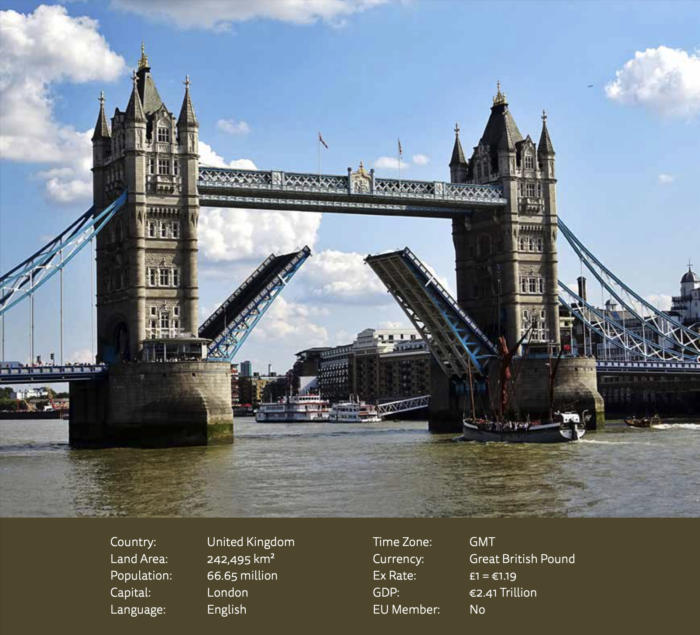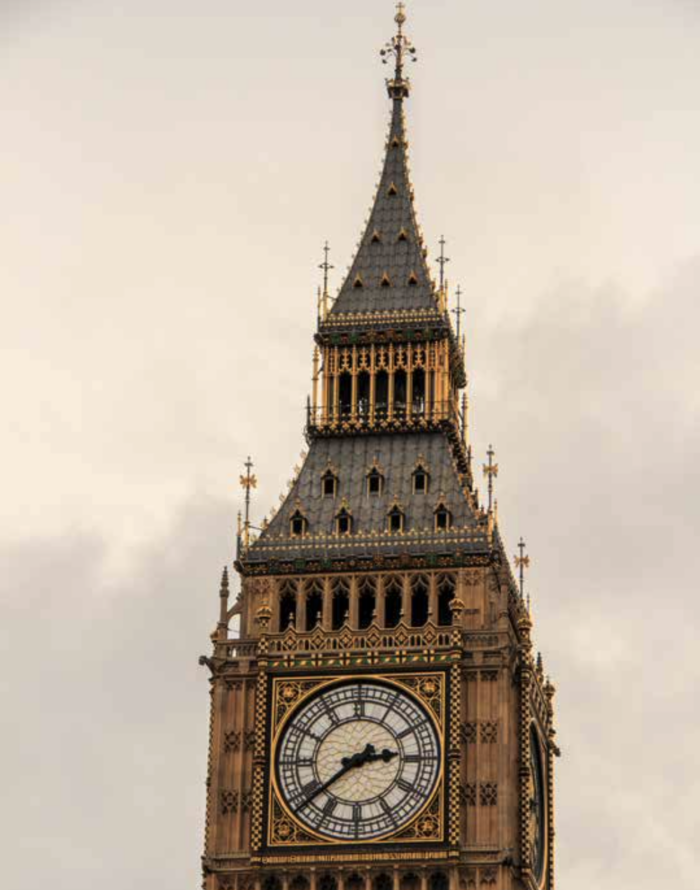The United Kingdom is actually made up from the unification of four different countries, England, Wales, Scotland and Northern Ireland but how they came to be unified is not as harmonious as it sounds.
After having been conquered by everybody from the Romans to the Saxons, the Vikings and the Normans, the English eventually won a battle and conquered Wales in 1282. Scotland became part of the British crown in 1602 when the king of Scotland became King James I of England. The union became official in 1707. Ireland became a part of the union in 1801. However, many of the Irish rebelled and, in 1921, the southern part of Ireland was made a separate country and became the Irish Free State.
In the 1900s, the United Kingdom became less of a dominant world power. It continued to lose control over colonies and was weakened by World War I. However, under the leadership of Winston Churchill, the United Kingdom was the last western European nation to oppose Germany in World War II and played a major role in defeating Hitler with the help of the United States and Russia.
Despite now having left the European Union, it cannot be denied that the United Kingdom has played a huge part in the history of the world, taking a leading role in developing democracy and in advancing literature and science.
Principal Industries in the United Kingdom
The U.K.’s main industries are in banking and finance, steel, transport equipment, oil and gas and tourism.
Other Important Industries
Although the above industries are the main ones in the U.K.’s economy, there are other industries which are still important. These include aerospace, defence, plant equipment and ship building, among others.
Doing Business in the U.K.
Despite Brexit, the UK is one of the most prosperous and stable markets in the world, with a high wealth per capita and plenty of opportunities for capital acquisition, especially within London.
Starting a business in the UK is really easy for newcomers and foreign nationals. You can establish a Limited Company in Britain without having to go through any unnecessary bureaucracy. You don’t need VISAs, agreements of trade or anything else — and there is no requirement for specific ID or passports. All you need is a company name, at least one director, to provide all necessary documentation (not as intimidating as it sounds) and to follow the process of registering for taxation.
The View from the Ground
When describing a country and its culture, you can write down all the facts and figures you like but if you want the full story, you need to get the perspective of someone with a lived experience of being there. That’s why we’ve asked Oliver to give us his take on what it’s like to live and work in the UK.
Regarding the UK, I would say don’t set any meetings for Friday afternoons. Friday afternoons are definitely not part of the working week in the UK. Maybe now, with more flexible work that might change a bit but when you had the office culture back a couple of years ago then, from my memories anyway, if you’re trying to speak to anyone after 12:00 o’clock on a Friday, it’s unlikely that you’re going to get through to them. Or, if you do, it’s highly unlikely that you’re going to have a serious conversation. I think generally though, the UK is quite an open market these days with quite open-minded people. It’s also more informal than say, Germany for example.
In terms of contacting customers, we do a lot of activity on LinkedIn and people tend to like interacting with social media, and don’t forget just the old-fashioned picking up the phone and having a call with somebody. That’s still very easy to do and people like it as long as you stick to the point. If you compare it to the US for example, where they’re a bit more over the top, I think the UK is a bit drier, especially when you factor in the sense of humour. In my experience, UK customers just prefer that it’s an honest conversation and quite to the point.
I think British people can be fairly passive aggressive, but they are also non-confrontational, so you can end up with a situation where a customer has said he’ll consider it but was actually trying to get rid of you. The English are also quite insular, so it can be difficult to sell into the UK from abroad. There is a section of the society that likes things to be British and would automatically be wary of phone calls coming in from an unknown French or German number. In fact, at my previous company when I was working for the UK market, I needed a UK extension phone number so that when I was calling the UK they saw it come up as from the UK rather than a German number calling them. I think it’s absolutely true that they would probably prefer and feel more comfortable doing business with other people from the UK. They will work with Americans though. I think there’s a good relationship there. They make a bit of fun out of each other for sure but that’s more on a personal, cultural level rather than a business level. I would say there’s a lot of respect there business wise.
In terms of business relationships, I think you don’t need to know somebody to do business but as we’ve seen in politics, you still give business to people you know. So, I think building up some sort of rapport and then developing a relationship with different people is only going to help. To give an example from my previous company, I started doing workshops around the UK so was meeting different people all the time. So, once you’ve met them, you can go for a coffee after the workshop and really speak to them in more detail. This helps with the follow up conversations over the next month as a salesperson. So, I think it’s somewhere in between. Business relationships in the UK are not completely unimportant but I wouldn’t say they are as important as they are in Italy or Russia.
As an English person, you can make a connection quite easily. As a non-English native, a lot will depend on how good your English is. So, I think this is one of the issues with the UK in general and it’s that people don’t learn foreign languages and they expect everyone to speak English. This is why we have a lot of close relationships with the US and with Australia as they speak English natively. Therefore, I think it is more difficult for a European rather than another British person, American or Australian. Although, there is a common perception that the Dutch and the German are good at English.
Small talk is a reasonably big thing in the UK, so even if you’re too direct with an email or something then that won’t go down well. Also, if you’re in a meeting, and I know there are some European countries where it’s very much straight down to business, but here, the first five to ten minutes are chit chat. This could include humour as well. The British are good at self-deprecating humour and sarcasm.
Another thing the British like is a drink. The Germans take it to another level at some of their trade shows, but the Brits can hold their own in the after-work drink stakes. The pandemic has changed things, of course, and I was reading an article talking about possible inequality arising out of flexible working. The people who go to the office and stay for a social drink afterwards might find it easier to climb the career ladder if they’re socialising with the right people. Whereas those who are less likely to go to the office may be passed over for a promotion simply because they have not been a visible presence at work or at social events.
It would be difficult to talk about business in the UK without mentioning Brexit. While there are still some die-hard supporters, there’s absolutely no way that 52% are still in favour. With recent shortages of food and fuel, most people are beginning to see that they were sold a pack of lies by those who were promoting the leave cause. Fishing and agriculture have been decimated and already, companies have relocated to Dublin, Frankfurt and Amsterdam but Royal Dutch Shell has decided to go against the tide and relocate their headquarters to the UK.
Business Etiquette
The British value punctuality, and being late, especially for a business meeting will be considered very impolite. As far as attire is concerned, business suits are normal although certain domains may take a more casual approach. Greetings are done with a firm handshake, and this is the same for men and women. Quite often, business cards are exchanged but not
everyone has them so don’t be offended if someone doesn’t offer you theirs. Meetings are driven by an agenda which is often circulated to all participants before the meeting begins. A good point to note is that the British tend to avoid direct speech and prefer to use more polite suggestions and indirect speech. Be sure to remember this in meetings.






